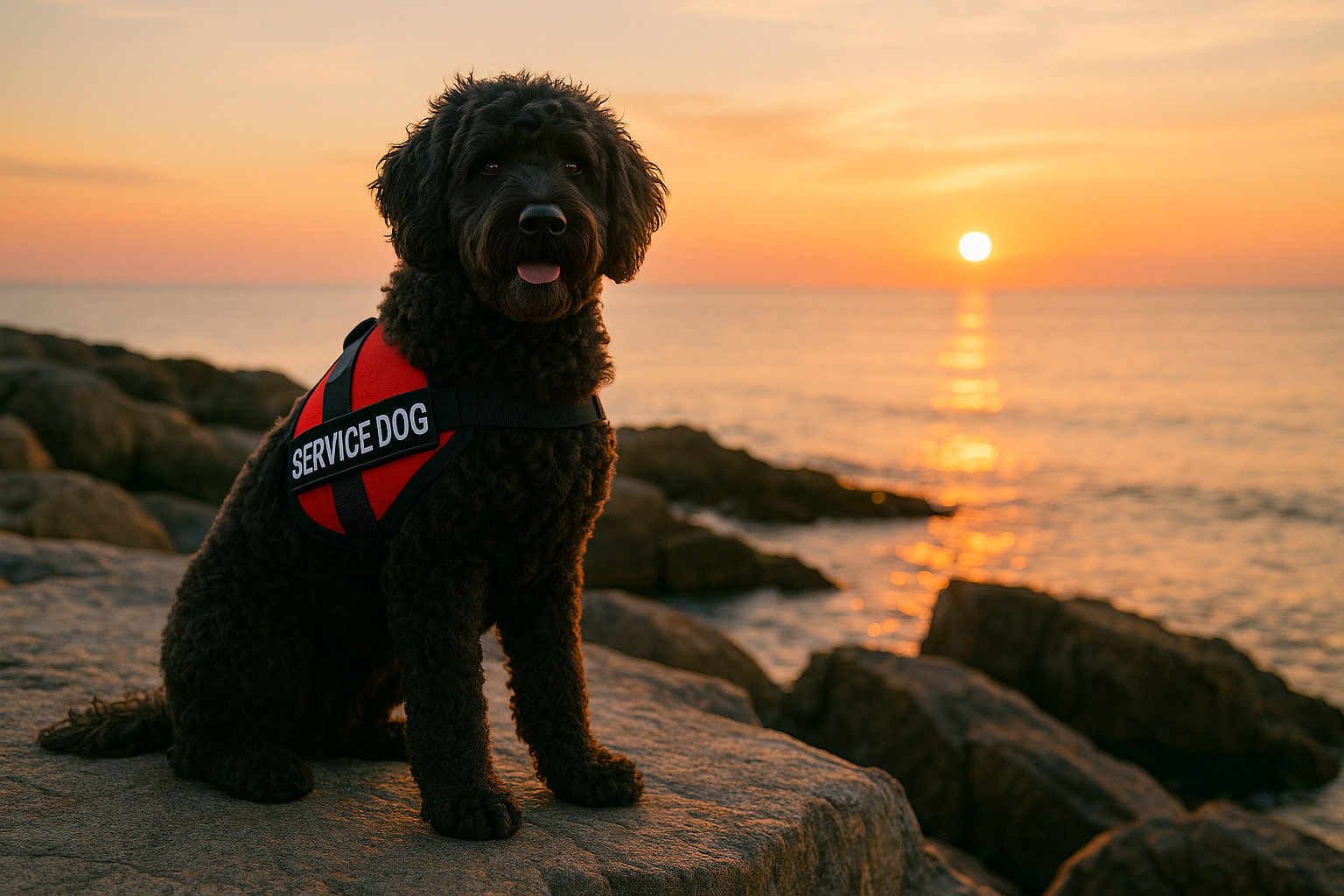Portuguese Water Dog as a Service Dog
Get Your Documents

The Portuguese Water Dog, renowned for its historical background as a fisherman’s assistant, is increasingly being looked at as a potential service dog candidate. Combining intelligence with a loyal and hardworking demeanor, these dogs possess a variety of qualities that can be advantageous in the realm of service work. However, like any breed, they have specific traits and requirements that need careful consideration for service roles.
Portuguese Water Dog Overview
Physical Characteristics
Portuguese Water Dogs are medium-sized, athletic canines with a robust build, characterized by a muscular body and an energetic gait. Typically, males stand between 20 to 23 inches tall and weigh 42 to 60 pounds, while females are slightly smaller, measuring 17 to 21 inches in height and weighing 35 to 50 pounds. Their size makes them suitable for environments where mobility assistance might be needed without being too large for close quarters.
- Coat: They have a curly or wavy water-resistant coat, traditionally kept in a lion clip (shaved rear and legs) or a retriever clip (more uniform trim). Regular grooming is essential to maintain their coat and prevent mats, which can be time-intensive for handlers.
- Energy Levels: These dogs are energetic and require substantial physical exercise—ideal for active individuals or those needing a service dog that can keep up with a dynamic lifestyle.
- Adaptability: Built for water work, their webbed feet and strong swimming ability could be advantageous for specific service tasks in aquatic environments.
Temperament and Attitude
Portuguese Water Dogs are celebrated for their intelligent, spirited, and adventurous nature. Their temperamental facets are pivotal in their suitability for service work, featuring a blend of loyalty and independence that supports a deep bond with their handler while allowing them to work autonomously when necessary.
- Intelligence and Trainability: They are quick learners, excelling in tasks where their problem-solving capabilities can be utilized. However, their intelligence can lead to a degree of independence that may be challenging for novice handlers.
- Sociability: Generally friendly and amiable, they engage well with humans, making them suitable for roles requiring interaction with different people. Nonetheless, they might require training to mitigate overly enthusiastic greetings.
- Stress and Environment: Their adaptable nature suits them to various public settings, though some Portuguese Water Dogs can be reserved with strangers, necessitating thorough socialization from a young age.
Types of Service Work
The Portuguese Water Dog’s characteristics make them versatile across several service roles, although certain jobs may align better with their natural talents and disposition.
- Psychiatric Service Work: Their keen sensitivity to human emotions can make them excellent candidates for psychiatric service roles, where they might assist individuals with anxiety disorders or post-traumatic stress disorder (PTSD) by providing grounding and support.
- Mobility Assistance: With their strong build and energetic nature, they can assist with tasks like retrieving items or opening doors, although they may not be ideal for heavy weight-bearing tasks due to their size.
- Medical Alert: Their intelligence and concentration skills can be harnessed for medical alert work, such as alerting to low blood sugar levels in diabetic individuals.
- Emotional Support: Their friendly demeanor and eagerness to please also render them well-suited for roles as emotional support animals, providing companionship and comfort.
Health Considerations
When considering a Portuguese Water Dog for service work, it is critical to acknowledge breed-specific health considerations that may affect their performance and longevity in such roles.
- Hip Dysplasia: This hereditary condition can affect their mobility, potentially limiting their suitability for tasks requiring extensive physical activity or weight support.
- Progressive Retinal Atrophy (PRA): A degenerative eye disorder that may lead to blindness, affecting their ability to serve as guide dogs.
- Grooming Needs: Their dense coats require regular maintenance which could be demanding for some service dog handlers, impacting the practicality of this breed in service roles.
- Longevity and Care: With an average lifespan of 11 to 14 years, they require commitment to health and wellness throughout their service career to sustain their capacity for rigorous roles.
Training and Suitability
The trainability of the Portuguese Water Dog hinges on tapping into their intelligence and energy in a structured manner. They excel in environments where training is consistent, positive, and can channel their natural inclinations.
- Training Approaches: These dogs respond well to reward-based training incorporating praise, treats, and toys. Consistency and variety in training tasks help retain their focus and enthusiasm.
- Challenges: Their independent streak can sometimes manifest as stubbornness; therefore, they are best suited for handlers who can establish clear leadership and engage them mentally.
- Consistency and Routine: A regular training routine helps solidify their learning, while varied exercises prevent boredom and behavioral issues stemming from under-stimulation.
Summary of Portuguese Water Dog
The Portuguese Water Dog presents a unique blend of features that can align well with various types of service work. Their robust build, intelligence, and eagerness to please mark them as contenders for roles spanning psychiatric support to mobility assistance.
Key strengths:
- Intelligent and trainable, adapting well to different tasks.
- Medium size is suitable for mobility without being cumbersome.
- Generally friendly and sociable, making them approachable.
Potential weaknesses:
- Requires extensive grooming and consistent training.
- Can exhibit independent behaviors, requiring experienced handling.
- Prone to specific genetic health issues affecting mobility and vision.
Ideal service roles:
- Psychiatric service due to sensitivity to handler’s emotional state.
- Mobility assistance for retrieving and light-support tasks.
- Medical alert with proper training due to their excellent sensory perception.
The Portuguese Water Dog’s rich history as a working companion on the open seas translates into a versatile service dog that contributes to a range of service needs, given ample training and care. However, their energetic nature and grooming demands must be thoroughly considered to ensure successful integration into a service-oriented lifestyle.
Get Your Documents
Example State Cards













